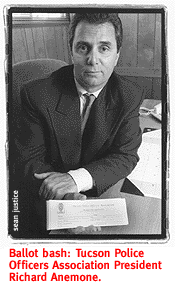
Tucson Cops Fire Up A Tough New Bargaining Unit.
By Dave Devine
WHEN THE VOTES in the secret ballot for police union representation
had been counted last week, the newly formed Tucson Police Officers
Association (TPOA) had ousted the long established Fraternal Order
of Police (FOP) as the sole bargaining unit for officers.
The immediate impact of this change will be to force renegotiation
of an already approved three-year labor contract which was to
take effect July 1.
Also, the long-standing issue of pay for cops should become a
very lively topic during the upcoming City Council discussion
on Tucson's budget for the next fiscal year.
Richard Anemone, TPOA president, attributes his group's victory
to the feeling of many within the Police Department of a dire
need for change. Even though outnumbered in membership by more
than 3 to 1, the TPOA won the election by a comfortable margin.
Anemone cited as one reason for the result the denial of promised
merit pay increases for officers in four recent years. He says
this is perceived as a demonstration city government isn't being
fair with officers, especially younger ones.
Another problem often cited by TPOA members is the City Council's
abandonment several years ago of a market-based pay plan. It was
replaced with across-the-board raises which were more politically
popular, because every city employee was treated the same. But
it left Tucson's cops making less than those who work in much
smaller communities.
While city administrators may blame these problems on budget
shortfalls, some TPOA members allege they were caused instead
by the City Council's wasteful spending. The lack of merit increases,
they say, has led to the situation where an officer with five
years experience is paid the same as someone with only two years
on the job.
To address the pay issue, Anemone says he wants to improve communication
between his organization and city management, and he pledges his
group will bargain in good faith. City Councilman José
Ibarra agrees it's important for the TPOA to communicate well
in order to address their concerns.
 This, however, may be difficult. Anemone admits some of the members
of the TPOA think City Manager Michael Brown failed to keep his
promise about being impartial prior to the election. Other TPOA
members put it more bluntly, accusing Brown of trying to put roadblocks
in their way before the vote.
This, however, may be difficult. Anemone admits some of the members
of the TPOA think City Manager Michael Brown failed to keep his
promise about being impartial prior to the election. Other TPOA
members put it more bluntly, accusing Brown of trying to put roadblocks
in their way before the vote.
If he did, maybe it was because Brown didn't think the TPOA had
a chance of winning. According to Ibarra and others, most people
in City Hall and upper-level management in the Police Department
thought the FOP would win.
When they lost, the failure to predict the outcome was reportedly
blamed on poor intelligence work. Instead of recognizing discontent
and hard feelings within the Police Department might lead to a
change, city management just assumed the FOP would win.
Now that the TPOA is the bargaining group for officers, Ibarra
says he wants to see the City Council develop an acceptable pay
plan with them. While admitting this issue will be the top priority
during the upcoming budget discussions, Ibarra would not commit
to increasing police pay in the next fiscal year above the recommended
one-year merit increase. Instead, he would say only that he hoped
to see something done and added there was a possibility of at
least starting to correct the situation.
Anemone sees it differently. In his opinion, the City Council
must cut the fat out of next year's budget and set priorities
for spending. He believes public safety is the community's number
one priority and addressing the pay issue of police officers is
the place the Council should start to demonstrate that.
While the TPOA and city management are discussing the potentially
high-priced issue of police pay, they will also have to reopen
the labor contract approved by the City Council in February. Why
that contract was even negotiated with the FOP prior to the election
raises some questions. Ibarra says he asked the City Manager about
the timing and was told negotiations were already underway before
the election became necessary.
The approved contract, which covers items such as overtime pay,
uniform and equipment allowances, and other benefits, will be
only a starting point for discussions, according to Anemone.
He says he'd like to see some improvements in the contract but
is willing to bargain in good faith with the City Manager's negotiating
team.
What will happen with both the salary and contract issues remains
to be seen. The election results indicate most police officers
favor the more aggressive union representation promised by the
TPOA. Whether the TPOA can deliver, especially dealing with a
City Manager who may be less than receptive to their ideas, will
depend on which way the political winds are blowing in Tucson
in the next few months.

|
